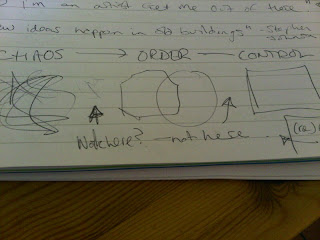Yesterday I gave myself a treat of a day and went to TEDxYork, organised by Marcus Romer and Pilot Theatre. This was a very different kind of day to the Stronger Together event last week, although there were some people in common, and it was similarly well-delivered. (Can I suggest there's a sideline for theatre people in running/designing conferences, they seem to handle the 'theatrics' of them better than conference organisers.) It was a kind of festival of storytelling and idea sharing and listening, with short bouts of discussion that looked, to the old-fashioned eye, like lunch and coffee breaks. The main sessions didn't even have questions - you just moved on to the next bright person. Some of the talks were better than others, but only a couple didn't give me at least one thing to think about or write down.
There were lots of I-Pads out. It was that kind of a crowd. Here's a few of the things I wrote down in my high tech Pukka Pad.
- First Sinclair games machine had 1K memory. An I-phone has 32 million times more than that.
- Cost of making cutting edge computer game has increased 10,000 fold last 15 years, and in 15 years before that.
- Ubiquitous broadband and mobile internet allows the kind of connection with mass audiences that niche/cult/indie producers and promoters traditionally have
- XTK Projects: 'peer-sourced funding for ideas that don't exist yet' (Just looked at this and they coin a brilliant term: 'primordial capital'. Kristin Alford was a good speaker, but she could drop that in.)
- Work where chaos meets order, or in chaos, rather than rushing to turn order into control
- 'Talk about success or talk about failing spectacularly' - fine, but what about miserable failure - the kind that drags and is just horrible and energy sapping - failure isn't always going down in flame.
- The loyalty of phone boxes.
- Is vernacular social science (eg Information is beautiful) challenging academic social science with its account-based approach, even if complemented now by data.
- No more lies to sociologists
- It's a brave man who shows us pictures of his teddy bears
- Resilience as Agency, Relatedness and Competence
- Flyposting is illegal, Google map pins are not
- Technology as a material, not a tool
- Can arts venues learn from how high end restaurants treat customers?
- Are we turning the music industry into Pizza Express?
- We need a view on the world not a position in the market
- We are in the business of dis-enthralling
- Must read Proust and The Squid by Maryanne Wolf
- That humans learned to read is a miracle - are we now learning to do something else?
There was of course, much more, but they could each become a blog in their own right.
The day was themed around inserting the A of Arts in the STEM subjects of Science, Technology, Engineering and Mathematics to make a new STEAM age. A number of speaker made passing reference to this, but it was mainly left implicit. There was a good range of examples in the programmes though, from theatrical and game-based storytelling to cello playing to amazing 'Digital Duets' between artists in Manchester and New York. My one conclusion about this was that we need to widen our definition of Art to actually do this, to make Art a driver of change and energy in society in the way steam was.

Comments
Post a Comment